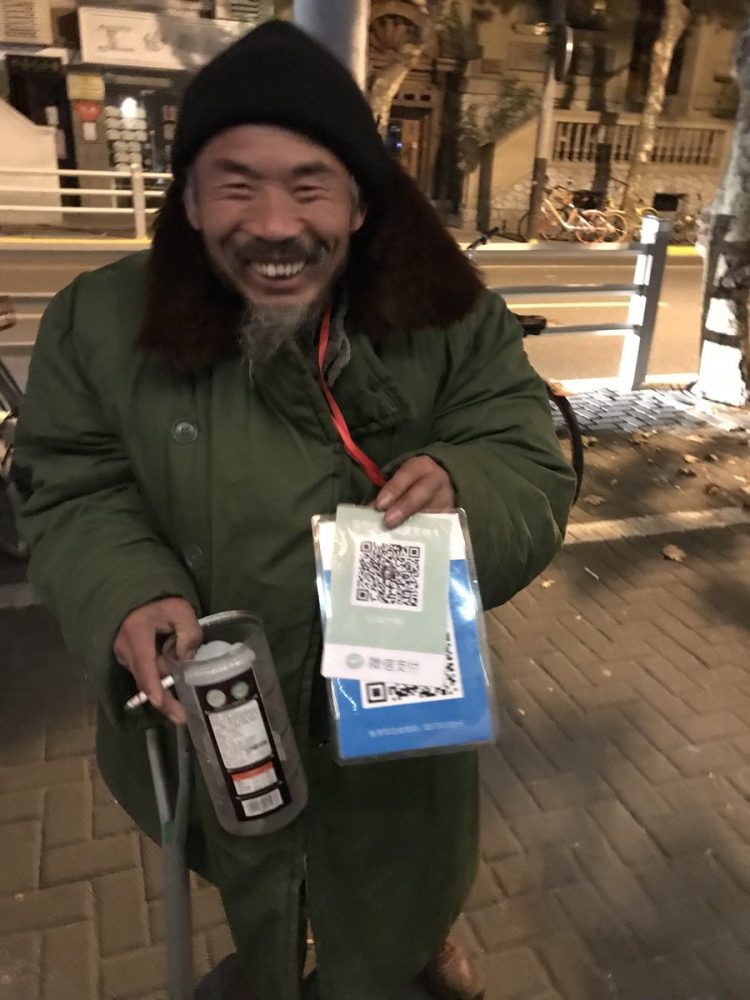If you still have any doubts that mobile devices have taken over our lives, this should make you a firm believer: smartphones and QR codes have become tools of the trade for Chinese beggars.
If you’re feeling generous, you can simply whip out your phone, scan a a printed QR code and transfer some money to the beggar’s account.
Local media have spread news of mobile-savvy beggars in the city of Jinan, in China’s Shandong province. They gather in areas popular with tourists, holding begging bowls that contain a QR code printout.
Anyone with Alipay, WeChat Wallet, or some other mobile payment app can scan the code and make a donation. Wait, beggars in China have mobile phones? Well, according to state media outlets, that’s not actually a rare thing.
One of the beggars who caught the media’s attention was reportedly a man with mental problems and the QR code he had was made by his family to help him. However, it appears that QR code begging serves other purposes besides generating income for people down on their luck.
According to digital marketing company China Channel, many beggars in Beijing receive payment from local businesses for every QR code scanned by passers-by. The enterprises use these scans to collect people’s data from WeChat profiles, then sell the IDs for quite a pretty penny to small businesses. The latter use the information to bombard the users with unsolicited in-app advertisements.

Since passers-by don’t actually have to give any money, they are not all that difficult to persuade. However, the “beggars” get paid for their efforts: each QR code scan pays between 0.7 and 1.5 yuan ($0.10 to $0.22). A 45-hour working week nets a monthly average of 4,536 yuan ($685), which is quite decent given what Chinese workers in minimum wage jobs get.
The whole thing may sound weird to foreigners, but it must be noted that China is perhaps the country closest to a cashless economy and QR codes are the reason for that.
The black-and-white, two-dimensional barcodes are used in all sorts of ways: from payment in shops to tips in restaurants and cash gifts at weddings. In fact, mobile payments in China exceed 50 times the volume for the US, where the 2016 tally was $112 billion.
According to consumer behavior researcher Chen Yiwen, China is on the verge of a“codeconomy.”
“China has started the transition to a cash-free economy faster than anyone could have imagined, largely because of the viral spread of two-dimensional barcode. It creates a new economy based on scannable codes.”
Interestingly, Western beggars are not that far behind their Chinese peers, when it comes to mobile payments. A few years ago, professional beggar Damien Preston-Booth made headlines for using a mobile card reader and accepting donations via credit card.
Latest Stories
-
Africa Food Systems Parliamentary Network urges governments to increase investment in agriculture
8 hours -
AU and partners urge youth to get involved in efforts to transform continent’s food systems
8 hours -
Fire kills 3-year-old at Asawase-Dagomba Line in Ashanti Region
8 hours -
Paskal A.B. Rois: How Mahama inspires me
9 hours -
Complete abandoned projects in Akatsi North District – Chiefs to Mahama
9 hours -
Painter and sculptor B. Acheampong turning his passion for art into profitable venture
10 hours -
Presidential lodge, RM residency in Ashanti region left to rot away
10 hours -
Herty Corgie highlights the essence of gratefulness in ‘My Gratitude’
12 hours -
ANNOUNCEMENT: Joy FM temporarily goes off air January 11
12 hours -
Yango honored with two titles at the Technovation Africa Awards 2024
12 hours -
Aowin Traditional Council declares war on illegal mining with spiritual intervention
12 hours -
Leadership must ensure equity for all citizens, regardless of faith – Asiedu Nketiah
12 hours -
Prof. Alex Manu appointed Executive Director at Centre for Social Justice
13 hours -
Imminent changes within some key security agencies, state institutions, and its implications
13 hours -
There are more women than men, but there’s a man for every woman – Rev. Nana Yaa
13 hours

